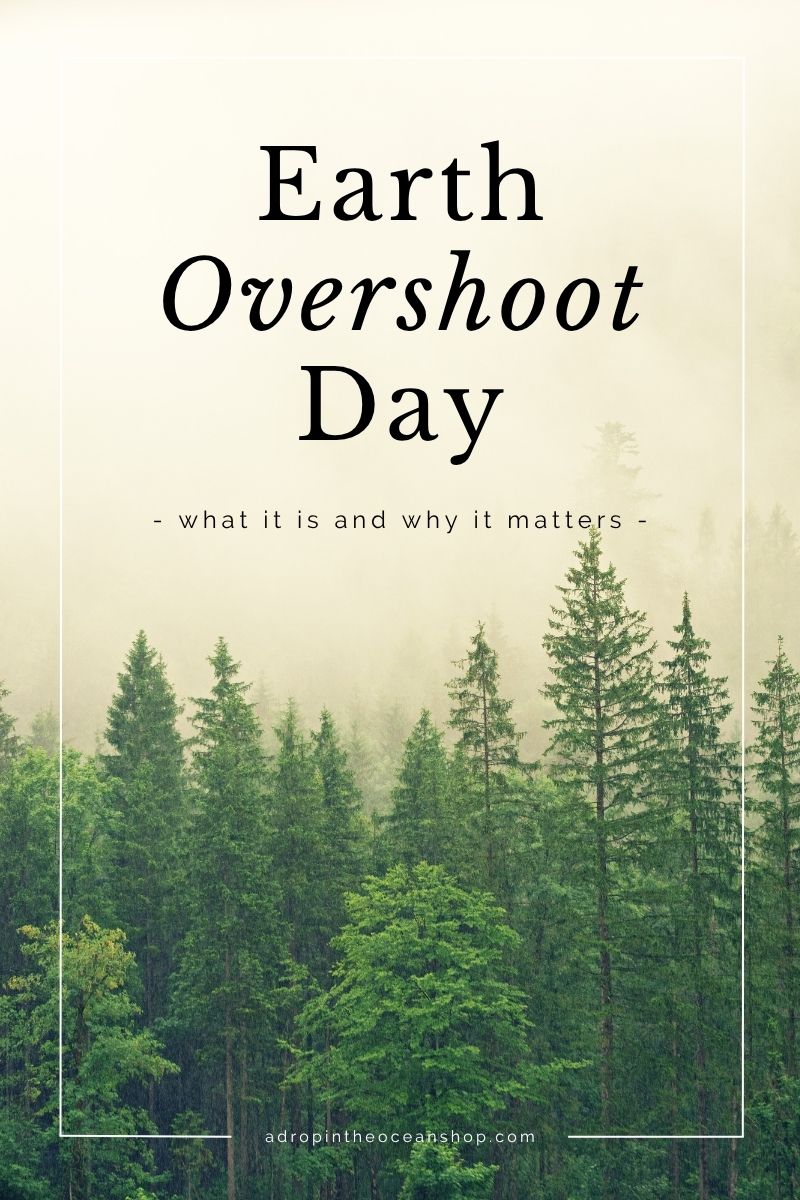What is Earth Overshoot Day and why does it matter?

This post first appeared in our weekly Make Waves Mondays email series on August 1, 2022 and was updated and re-shared again on July 21, 2025.
Hello hello friend!
Okay so FIRST. Before we dive into today’s blog, it’s STORY TIME! 🤩
You may remember a few years ago our blog all about why you should wash your laundry on cold as part of our “Small Change, Big Impact” series.
In this post, I shared that washing your laundry on cold saves an absolute ~boatload~ of energy (and therefore money) because heating up the water uses 90% of all the energy needed to do a load of laundry.
WELL.
GUESS WHAT HAPPENED.
Last month, the cold water on our washing machine wasn’t working, so we had to wash everything on warm instead.
Not hot. Just warm.
Our energy usage for the month went up a whopping 35% (!!!) from June 2024. Which also meant that, even when accounting for increased usage fees, our utility bill was up 18% from last June.
And for the record – there’s only two of us. We don’t do a ton of laundry.
But this month our cold water has been fixed and our July utility bill is back to being almost identical to July 2024.
Moral of the story: Wash your laundry on cold, friends 😎✌
(And yes, our laundry detergent powder really does work fantastically in cold water!)
Now, moving onto today’s blog…
Later this week, we’ve got a big day coming up: Earth Overshoot Day.
Whether you’ve never heard of Earth Overshoot Day or you just need a lil’ refresher, let’s dive into what it means, why it matters, and what you can do to make an impact 👇
What is Earth Overshoot Day?
Earth Overshoot Day is the day each year that we have used more resources than the earth can sustainably provide in that year.
Earth Overshoot Day = (Earth’s Biocapacity / Humanity’s Ecological Footprint) x 365
It’s calculated each year by Global Footprint Network by dividing the Earth’s biocapacity by the ecological footprint of all humans, and multiplying by the number of days in that year.
💡 Biocapacity is the amount of ecological resources that Earth is able to regenerate in one year.
Every day following Earth Overshoot Day we are living in a resource debt.
This means that the earlier in the year Earth Overshoot Day falls, the more rapidly we’re using resources that Mama Earth cannot replenish.
Over the past 50-some years, Earth Overshoot Day has been pretty steadily moving up.
In just 1971, Earth Overshoot Day landed on December 29th.
This year, it’s falling on July 24th.
That means to sustainably replenish all of the resources we use as a planet this year, we would need 1.8 Planet Earths.

What are Country Overshoot Days?
What’s potentially even more concerning than Earth Overshoot Day itself is that each country has its own Overshoot Day as well.
This is the day each year that Earth Overshoot Day would land on if the entire world lived like the people within that given country.
This year, here in the United States, our Overshoot Day fell on March 13, 2025.
Yeah… We couldn’t even make it through winter without using up all of the resources we should be using throughout the entirety of the year.

So why does Earth Overshoot Day matter?
Okay so let’s say that you have a monthly budget of $5,000. You won’t earn any more than $5,000 in the month, and you can’t borrow any.
But then, 17 days into the month, you’ve already spent $5,000.
How will you survive the remaining 13 days?
Maybe you’ll put the rest of your expenses on a credit card, but eventually you’ll reach the limit on the card, and it’ll be more difficult to pay it off the longer you keep using it.
We KNOW this is not sustainable. Living that far outside of your means will not last you long.
It’s the same with Earth Overshoot Day.
When we’ve used all of the resources she can provide us in a given year when we’re just over halfway through, what do we do?
We pull from reserves and generate waste that makes it even harder to pull ourselves out of it. The Global Footprint Network calculates Earth Overshoot Day each year to help us put into context just how massive our impact on the planet is – and to provide us with tools and resources to #MoveTheDate.
What can we do to #MoveTheDate?
“While our planet is finite, human possibilities are not.” – EarthOvershootDay.org
Friend – we’re smart cookies.
We have the knowledge, the innovation, and the tools at our disposal to find solutions to the planet's biggest climate challenges.
The team behind Earth Overshoot Day has put together some incredible resources and numbers to demonstrate just how much of an impact we really can have if we made even small changes.
They’ve divided them into five categories, each one with immense possibility to move us towards the sustainable future we envision:
Planet = how we help nature thrive
Cities = how we design and manage cities
Energy = how we power ourselves
Food = how we feed ourselves
Population = how many of us there are
I think it's also valuable to note here that most of the solutions suggested by Global Footprint Network to #MoveTheDate involve policy shifts and top-down changes. It's a good reminder that while there is A TON that we can do as individuals, advocating for large-scale societal changes is also an important piece of the puzzle.

But for you, my friend, if you’re looking at this going, “Holy moly, Krystina! That’s so much information and so many things to do! How do I know where to start and what’s going to make the biggest impact for me and my lifestyle???” …you know I gotchu.
A few years ago, I wrote a whole blog post all about how to calculate our individual ecological footprints, including our own Personal Overshoot Day.
And you know what’s just so great about going through this process of calculating your footprint?
Your results are broken down into five different categories, too – food, shelter, mobility, goods, and services. And that “services” category? That’s all of the societal services we’re provided as citizens (things like fire departments, hospitals, schools, government offices, military, etc.).
AKA things that are outside of our personal control.
So let’s say you calculate your footprint, and you bike nearly everywhere rather than drive, so your Mobility impact is way down. But then maybe you also love shopping from Amazon, so your Goods impact is higher.
Your results will show you exactly where you can focus your efforts to have the biggest impact in your life.
And if you’re looking for even more small changes to make that have big impacts, check out our whole blog series called just that – Small Change, Big Impact.
So now tell me, friend, what’s ONE thing you’ll do this week to #MoveTheDate?
Comment below and let me know!
Related:
21 Ways to Celebrate Earth Day from Home!
The Ultimate History of Single-Use Plastics: How did we become a disposable society?









Leave a comment